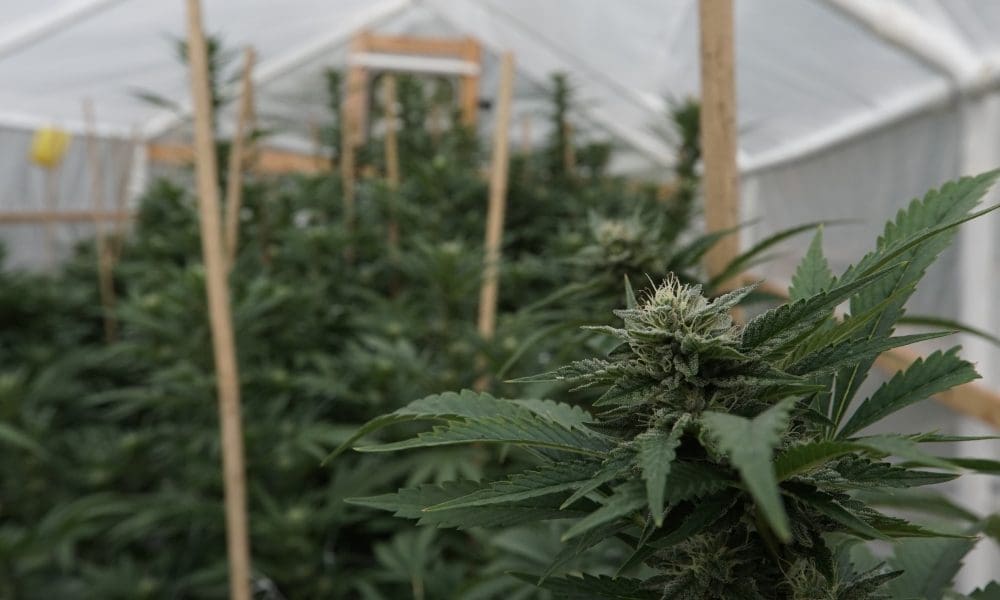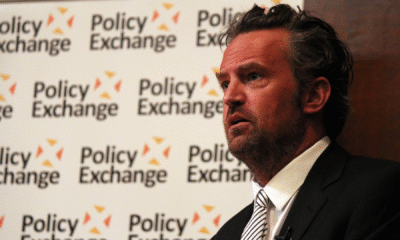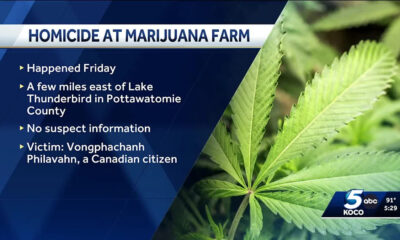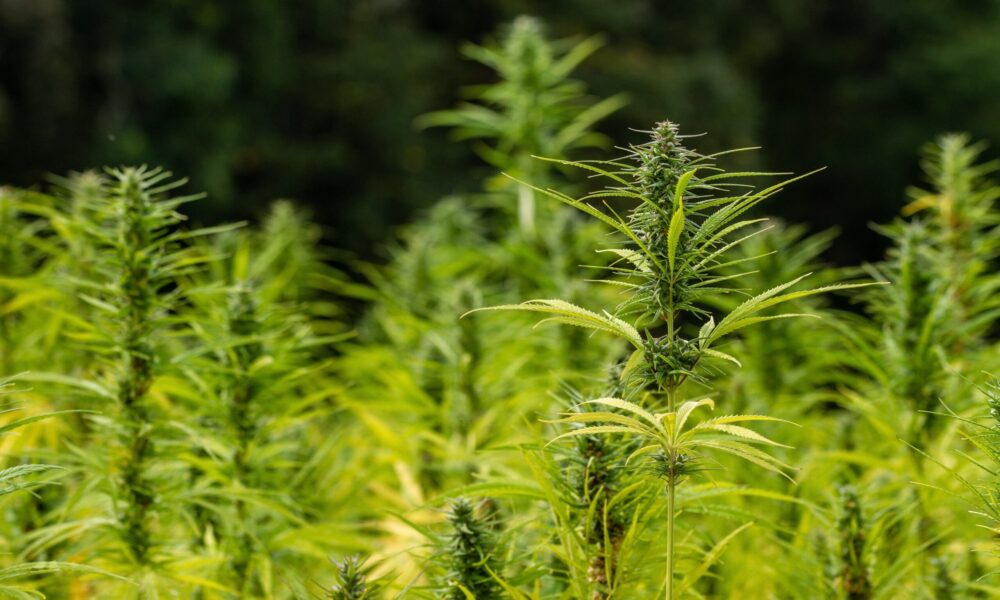featured
Trump’s DEA pick confirmed as cannabis rescheduling awaits (Newsletter: July 23, 2025)
Published
3 days agoon

DC marijuana sales ban advances in Congress; Fed event speaker: Legalization doesn’t boost youth use; TX hemp bills; MA sales
Subscribe to receive Marijuana Moment’s newsletter in your inbox every weekday morning. It’s the best way to make sure you know which cannabis stories are shaping the day.
Your support makes Marijuana Moment possible…
Hold on, just one second before you read today’s news. Have you thought about giving some financial support to Marijuana Moment? If so, today would be a great day to contribute. We’re planning our reporting for the coming months and it would really help to know what kind of support we can count on.
Check us out on Patreon and sign up to give $25/month today:
https://www.patreon.com/marijuanamoment
/ TOP THINGS TO KNOW
The U.S. Senate confirmed Terrance Cole as administrator of the Drug Enforcement Administration, and the National Cannabis Industry Association sent a letter urging him to complete the federal rescheduling process in a “timely and transparent manner.”
The House Appropriations Subcommittee on Financial Services and General Government approved a bill containing a rider to keep blocking Washington, D.C. from legalizing recreational marijuana sales, and leaving out cannabis banking language that was included in past sessions.
Rep. Jared Huffman (D-CA) filed a bill to let small marijuana growers and manufacturers ship products directly to consumers across state lines via the U.S. Postal Service once federal cannabis prohibition ends.
A top marijuana researcher at a federal event hosted by the Substance Abuse and Mental Health Administration said legalization doesn’t increase youth cannabis use and there’s even been a “decrease in rates of consumption” in recent years.
- He also discussed issues like terpenes, impairment testing, CBD products and the need for more nuanced regulation around cannabinoids themselves.
The Texas Senate State Affairs Committee approved a bill to ban consumable hemp products with any amount of THC as Gov. Greg Abbott (R) appeared to shift his position on the issue after previously vetoing similar legislation.
Pennsylvania senators filed a bill to clarify that a person’s status as a medical cannabis patient cannot be used against them in parental custody rulings in family court.
The Massachusetts Cannabis Control Commission announced that retailers in the state have now sold more than $8 billion worth of recreational marijuana products since legalization—in addition to nearly $1.5 billion in medical cannabis sales.
The Missouri Supreme Court ruled that cities and counties cannot stack local marijuana taxes.
A Missouri Cannabis Regulation Division official said its new process of conducting unannounced visits to marijuana facilities to collect product samples for testing shouldn’t disrupt business operations.
South Dakota farmers see hemp as a way to bring jobs to small towns and to pull heat-trapping carbon dioxide from the atmosphere.
/ FEDERAL
President Donald Trump’s nominee for director of the White House Office of National Drug Control Policy, Sara Carter, tweeted that a bill he signed to classify fentanyl-related substances in Schedule I is a “formidable weapon against the cartels and their dealers.”
The Library of Congress published an article about a new Italian hemp restriction law.
Rep. Doug LaMalfa (R-CA) tweeted that he’s “glad to see the EPA launching a formal investigation into the toxic pesticides being used at illegal grow sites in Siskiyou County. This isn’t just about illegal marijuana—it’s about banned chemicals contaminating soil and water and organized crime networks operating unchecked in rural California.”
/ STATES
Former Texas Gov. Rick Perry (R) said psychedelic therapy “isn’t a red or a blue issue. This is an American issue. This is a human being issue.”
The chair of the Pennsylvania House Health Committee said his panel will not take up a version of bipartisan marijuana legalization legislation and that the Senate should approve it first to “show us that there is a real serious interest” in the issue.
Alabama regulators are asking a federal judge to dismiss a lawsuit challenging their medical cannabis business licensing process.
Minnesota regulators held a lottery to award cannabis retailer business licenses.
Kentucky regulators conducted their first inspection of a medical cannabis dispensary.
California regulators held a workshop about the cannabis appellations program.
Washington State regulators sent a newsletter with updates on various cannabis issues.
Vermont regulators will host an event about cannabis rule amendments on Thursday.
—
Marijuana Moment is tracking hundreds of cannabis, psychedelics and drug policy bills in state legislatures and Congress this year. Patreon supporters pledging at least $25/month get access to our interactive maps, charts and hearing calendar so they don’t miss any developments.![]()
Learn more about our marijuana bill tracker and become a supporter on Patreon to get access.
—
/ LOCAL
The Colorado Springs, Colorado City Council overrode the mayor’s veto of marijuana revenue legislation.
/ INTERNATIONAL
The UK National Health Service will publish medical cannabis patient data by the end of the year.
/ SCIENCE & HEALTH
A study “supports Bedrocan® medical cannabis as an alternative treatment for [fibromyalgia] with a potential effect on [functional dyspepsia] and [irritable bowel syndrome] symptoms.”
A study found that “cannabis industry workers are at risk for [work-related asthma], emphasizing the need for interventions to address workplace respiratory hazards.”
/ ADVOCACY, OPINION & ANALYSIS
The Ohio Cannabis Coalition is launching a campaign to encourage safe marijuana use.
/ BUSINESS
Acreage and Verano are urging a federal judge to dismiss class action lawsuits accusing them of selling products with unlawfully high levels of THC.
Miss Grass launched a cinematic ad campaign for its hemp-derived gummies.
/ CULTURE
Former football player Ricky Williams discussed his cannabis meeting at the White House.
Make sure to subscribe to get Marijuana Moment’s daily dispatch in your inbox.
Photo courtesy of Chris Wallis // Side Pocket Images.

Author: mscannabiz.com
MScannaBIZ for all you Mississippi Cannabis News and Information.
You may like
-


Doctor Who Allegedly Said ‘I Wonder How Much This Moron Will Pay’ Pleads Guilty
-


Killing reported at Oklahoma marijuana grow operation
-


Texas Voters Want Synthetic THC Outlawed, Poll Shared By Proponents Of Reining In Hemp Industry Finds
-


Judge rejects No Savage’s rap culture argument – NBC4 Washington
-


California Moves to Ban Hemp Wellness Products — And the Weed Nuns Are Fighting Back
-


Cannabis & Psychedelics Reported Most Effective Non-Prescription Drugs by Eating Disorder Patients
featured
Doctor Who Allegedly Said ‘I Wonder How Much This Moron Will Pay’ Pleads Guilty
Published
14 minutes agoon
July 25, 2025
It’s been almost two years since the world woke up to the news of the death of Matthew Perry, one of the most iconic American actors of the ’90s and ’00s. Best known for playing the beloved and inexhaustibly funny Chandler Bing on Friends, Perry not only left an indelible mark on millennial pop culture but also became a powerful voice in raising awareness about addiction.
In his autobiography, Friends, Lovers and the Big Terrible Thing, the actor shared his painful story of substance abuse, seeking to provide hope and inspire others in this situation.
Although drug use was not initially suspected as the cause of death, Perry’s autopsy revealed that he died from the acute effects of ketamine. The actor had reportedly been receiving therapy with this substance to treat depression and anxiety. While this drug is becoming a more popular and scientifically backed treatment for mental health, supervision by a professional is essential to ensure safety and effectiveness.
According to CTV News, Perry did indeed have such assistance, but allegedly began taking more ketamine than prescribed without his doctor’s knowledge, obtaining it illegally.
Now, in a grim turn of events, the doctor who allegedly administered the substance to Perry has pleaded guilty. Dr. Salvador Plasencia is accused, along with four others, of supplying ketamine to the actor. Prosecutors allege the defendants exploited Perry’s history of addiction for financial gain.
Another defendant is Dr. Mark Chavez, who allegedly provided the drug to Plasencia. According to Chavez’s plea agreement, text messages exchanged between the two doctors reflect a disdainful and inhumane attitude toward Perry. One example: Plasencia allegedly wrote “I wonder how much this moron will pay” in reference to the actor.
His question did not go unanswered: according to Healing Maps, Perry paid approximately USD 55,000 for six to eight daily ketamine injections during the month prior to his death.
Furthermore, Plasencia allegedly visited the actor’s home multiple times to administer the substance, reaching exorbitant amounts (up to $12,000) per visit. He also allegedly taught injection techniques to Perry’s assistant, Kenneth Iwamasa, who is among the defendants as well.
Jasveen Sangha, known as the “Ketamine Queen,” is also among the accused, having allegedly sold the dose of ketamine later determined to be lethal. However, she has pleaded not guilty and has not yet reached an agreement with the prosecutor’s office.
On his part, Plasencia faces up to 40 years in prison, although he will likely receive a lesser sentence. Upon pleading guilty, he said he was “deeply sorry” and announced his intention to give up his medical license.
While he didn’t admit to selling Perry the lethal dose, he did acknowledge acting with full knowledge of Perry’s history of problematic substance use. In fact, when the actor suffered an episode of paralysis and spiked blood pressure after receiving an injection, the (soon-to-be ex-) doctor had no problem making more doses available.
Beyond the bitter taste left by these news, compounded by the deep affection that an entire generation felt for the actor, this case highlights several problems that can no longer be swept under the rug, such as the vulnerability of people suffering from addiction, their exploitation for profit by so-called professionals, and the trivialization of increasingly popular mental health treatments that, while scientifically proven to be effective, are not necessarily administered safely.
Disclaimer: All individuals mentioned are presumed innocent until proven guilty in a court of law. This article is based on publicly available legal documents and media reports at the time of publication. It is intended for informational purposes only and does not constitute legal or medical advice.
Photo: Policy Exchange, CC BY 2.0, via Wikimedia Commons / Cropped.

Author: mscannabiz.com
MScannaBIZ for all you Mississippi Cannabis News and Information.
featured
Texas Voters Want Synthetic THC Outlawed, Poll Shared By Proponents Of Reining In Hemp Industry Finds
Published
1 hour agoon
July 25, 2025
Proponents of reining in the largely unregulated intoxicating hemp industry in Texas shared new polling data on Wednesday indicating that majorities of respondents from both major political parties support outlawing synthetic cannabinoids, such as delta-8 THC, and would rather obtain therapeutic cannabis products through a state-licensed medical marijuana program than from a “smoke shop selling unregulated and untested hemp.”
The new survey comes as lawmakers, who convened for a special legislative session this week, reconsider banning all hemp products containing even trace amounts of THC and most other cannabinoids following a veto of similar legislation by Gov. Greg Abbott (R) last month.
Conducted in June by the group Baselice and Associates, the newly shared survey found that 68 percent of Texas voters overall support a ban on synthetic or lab-produced THC products, including 78 percent of Republicans, 56 percent of Democrats and 66 percent of independents.
Respondents were asked, “California, Arkansas and Colorado have outlawed synthetic or lab-produced THC”—with some respondents also told that Congress is considering a ban—”Should Texas outlaw synthetic THC?”
A second question posed a hypothetical: “If you wanted to take something with THC in it to help with chronic pain, PTSD, or some other ailment, then would you rather get your THC products: From a state regulated, medical marijuana program with a doctor’s prescription OR From a smoke shop selling unregulated and untested hemp?”
Among all respondents—600 people in total—72 percent said they would prefer a regulated program, 16 percent said they’d rather go to a smoke shop and 12 percent said they were unsure.
By political party, 79 percent of GOP participants said they favored regulated medical marijuana dispensaries, as did 72 percent of Democrats and 63 percent of independents.
The poll was circulated on Wednesday in a press packet as part of a news conference at the Texas Capitol led by Sen. Roland Gutierrez (D) and the state-licensed medical cannabis company Texas Original. A representative for Texas Original did not immediately respond to a question from Marijuana Moment inquiring about who commissioned the survey.
None one at Wednesday’s press event explicitly addressed the new polling data, though select charts were on display behind the speakers, who included Gutierrez, Texas Original CEO Nico Richardson and a patient and doctor registered under the Texas Compassionate Use Program, known as TCUP.
Gutierrez said at the event that he personally has “always been for a fully regulated—regulated—medical marijuana program and recreational program like we have seen in Colorado, California, Washington State” and others, but he argued that “in order to do that, we have to take the appropriate steps” to regulate or ban synthetic hemp products and halt their availability to minors.
“People at home need to be aware that there is zero age limit in obtaining this,” he said. “You can go to a convenience store right now, be a 14 year old kid and be able to buy a vape pen, and that simply is wrong.”
“All the science will tell you that that 14 year old is not ready for the introduction of cannabis into their body,” the senator continued. “And so we need to do better. And by doing better, we need to find a bill that has some regulation.”
Though the press conference was held just a day after a Senate committee advanced a new bill, SB 5, to outlaw possession, sales and other activity around all hemp products containing any detectable amount of THC or any other cannabinoid besides CBD and CBG, none of the speakers mentioned the measure or specifically called for its passage.
Gutierrez noted during a Q&A session that he voted in favor of SB 3, the hemp ban bill that lawmakers passed during the regular session and was later vetoed by the governor, but he claimed that was because he saw the measure as part of a tradeoff in exchange for expanding the state’s limited medical marijuana program, TCUP, through a separate bill that Abbott ultimately signed into law.
“We need to do better for this program,” he said. “We need to continue the expansion of TCUP and continue to find a…pathway for a completely regulated system—a tiered, regulated system like we have for alcohol.”
Regardless, he repeatedly emphasized that he felt the current situation—in which intoxicating hemp-derived products are widely available in the state—is unworkable.
“To do nothing, which is where we were when this veto began,” Gutierrez said, “is not a tenable situation for the youth of the state of Texas… We cannot have 13-year-old boys, 16-year-old girls, you name it, accessing cannabis with impunity.”
“This might sound strange from the guy that always wanted to legalize marijuana,” he acknowledged, “but we do have to do things appropriately and responsibly.”
Richardson, the Texas Original CEO, made a case at Wednesday’s press conference that the reason TCUP “works and is trusted by physicians and immunocompromised patients is because it is highly regulated,” allowing prescribing physicians and patients to be assured of a product’s purity and potency.
But he noted that stringent regulations in Texas cover the medical marijuana program, requiring that operators have badge access and surveillance systems at facilities, keep inventory in locked steel cages, pay to license and perform background checks on all employees, submit to state inspections, register products in advance of making them available to patients, submit to mandatory lab testing and comply with a host of other rules.
“By comparison,” Richardson said, “hemp-derived THC products do not have to abide by any of the regulations I just listed, even though most of the hemp products sold today in Texas are far more potent than what we are allowed to sell as TCUP medicine.”
The upshot, Richardson and other speakers said, is that untested, unregulated hemp products undercut licensed medical marijuana, ultimately putting patients at risk.
“No one should be surprised that a heavily regulated medical program cannot survive when it has to compete directly with an under-regulated recreational program selling the same or more intoxicating products,” the CEO said.
As lawmakers weigh whether to regulate intoxicating hemp products or ban them altogether, Abbott this week seemed to revise his own stance on the matter, apparently calling for regulated access to low-THC hemp items for adults.
Asked about the proposal, the governor told local media that he stands “in favor of doing all we can to protect the lives of our children, while also protecting the liberty of adults.”
“So the structure of what I’m looking for is this, and that is, we must continue to criminalize marijuana in the state of Texas—no change in the marijuana laws,” he said. “We need to ban THC, as well as hemp products, for children under the age of 21. We don’t want them to be exposed to that.”
He added that the state needs to “ban synthetics that are laced onto hemp products that are extraordinarily dangerous.” But once those safeguards are in place, the governor said, “we need to have a highly regulated hemp industry to ensure that farmers are able to grow it, and that hemp products that do not have an intoxicating level of THC on it and can be sold in the marketplace for adults to be able to use.”
Abbott gave a somewhat confusing definition of what he’d be comfortable with as far as allowable THC limits in hemp, saying there should be a “three percent” or “three milligram” cap, which is a meaningful difference. SB 5, on the other hand, would prohibit products with any quantifiable amount of THC or most other cannabinoids—explicitly exempting CBD and CBG from the ban, but industry stakeholders say that’s logistically unfeasible and would decimate the market.
“To be clear, with regard to adults—again, with minors, no access to it at all. For adults, we do want the THC level to be below 3 percent, or we’re doing it in milligrams, three milligrams of THC, and it’s called non-intoxicating levels of hemp that would be marketed,” he said.
Abbot further said that “every law enforcement official I’ve talked to has said the same thing, and that is, they don’t have the resources to regulate it… If they’re measuring the hemp product not based upon the current methodology, 0.3 percent THC, but on the milligram basis, it’s a whole lot easier to be able to measure it.”
Again, that’s not quite what SB 5 would accomplish—and stakeholders are voicing concern about the expedited legislative process that it’s moving through, urging supporters to contact their representatives and ask them to oppose the legislation.
“Even after hours of compelling testimony, the Senate State Affairs committee voted unanimously to approve SB 5, advancing the bill to the Texas Senate for a vote,” Heather Fazio, director of the Texas Cannabis Policy Center, said in an action alert on Wednesday.
She added that the Senate meets on Thursday and “could vote on SB 5.” However, she added that once it reached the House, “representatives are much more inclined to support regulation.”
(Disclosure: Fazio supports Marijuana Moment’s work via a monthly Patreon pledge.)
Separately, a spokesperson for the governor issued a statement that largely aligns with what Abbott described in the interview.
“Governor Abbott has been clear that Texas must do all we can to protect the lives of children while protecting the liberty of adults. Hemp products should be banned for those under the age of 21, with a full ban on extraordinarily dangerous synthetic products,” they said. “Adults should be able to access heavily regulated, nonintoxicating levels of hemp, and there should be strict legal enforcement of hemp that exceeds 3.0 milligrams total THC per serving. The Governor will continue working with the legislature to establish a framework that meets those goals.”
—
Marijuana Moment is tracking hundreds of cannabis, psychedelics and drug policy bills in state legislatures and Congress this year. Patreon supporters pledging at least $25/month get access to our interactive maps, charts and hearing calendar so they don’t miss any developments.![]()
Learn more about our marijuana bill tracker and become a supporter on Patreon to get access.
—
Meanwhile, response to questions from senators during Tuesday’s Senate committee hearing, most law enforcement speakers said they supported an all-out ban on hemp products containing any THC rather than attempts at regulation. Some later added, however, that they felt the state’s limited medical marijuana program, known as the Texas Compassionate Use Program (TCUP), should be expanded to ease access by patients—especially military veterans—who could benefit from therapeutic cannabis.
Notably, Abbott in June signed a bill into law that expanded the state’s list of medical cannabis qualifying conditions, adding chronic pain, traumatic brain injury (TBI), Crohn’s disease and other inflammatory bowel diseases, while also allowing end-of-life patients in palliative or hospice care to use marijuana.
SB 5 is among a small handful of bills introduced for the new special session to address consumable hemp products.
Among the other proposals are measures to require extensive product warning labels and limit how hemp products are packaged.
Abbott has specifically asked lawmakers to prioritize hemp regulatory issues during the special session that kicked off on Monday. Two other newly introduced bills are HB 160 from Rep. Charlene Ward Johnson (D) and SB 39 from Sen. Judith Zaffirini (D).
The former would require a number of warning labels to be carried on hemp products with any more than trace amounts of THC, cautioning that the products can cause “cannabis poisoning that can be life-threatening to children,” harm brain development in youth, increase “risk of mental disorders like psychosis and schizophrenia” and lead to anxiety, depression and substance abuse disorders.
SB 39, meanwhile, would prohibit hemp products from being packaged or marketed “in a manner attractive to children,” limiting packaging shaped like humans, animals, fruit, cartoons or “another shape that is attractive to minors” as well as packaging that looks similar to legal products already marketed to children, for example candy or juice. It would also outlaw misleading product packaging. Violations would be a Class A misdemeanor, carrying up to a year in jail and a $4,000 fine.
Separately, last week Rep. Nicole Collier (D) introduced a one-page bill, HB 42, designed to protect consumers in the state from criminal charges if what they believed was a legal hemp product turned out to contain excessive amounts of THC, making it illegal marijuana. It would prevent the criminalization of someone found in possession of a product that’s labeled as hemp but is determined to contain “a controlled substance or marihuana.”
In order for the person to obtain the legal protection, the product would need to have been purchased “from a retailer the person reasonably believed was authorized to sell a consumable hemp product.”
The governor also said last month that rather than ban consumable hemp products outright, he wants to see lawmakers establish a regulatory framework that treats cannabinoids “similar to the way alcohol is regulated.”
Lawmakers at Tuesday’s hearing said that criminalization of possession would only kick in on a person’s third offense, however that provision does not seem to be included in the current version of SB 5.
Ahead of the governor’s recent veto of SB 3, hemp advocates and stakeholders had delivered more than 100,000 petition signatures asking Abbott to reject the measure. Critics of the bill argued that the industry—which employs an estimated 53,000 people—would be decimated if the measure became law.
Texas lawmakers legalized the sale of consumable hemp in 2019, following enactment of the 2018 federal Farm Bill, which legalized the plant nationwide. That led to an explosion of products—including edibles, drinks, vape products and cured flower—now sold by an estimated 8,000 retailers.
Military veterans advocates, including Texas Veterans of Foreign Wars, also called on the governor to veto the hemp ban, saying it “would cause irreversible harm to communities across the state.”
Farmers said the prohibition would devastate a key sector of the state’s agriculture industry.
Following his veto, Abbott proposed an extensive list of policy changes that he said he would support—and which the legislature will have the chance to enact during the special session.
“Texans on each side of the Senate Bill 3 debate raise serious concerns. But one thing is clear—to ensure the highest level of safety for minors, as well as for adults, who obtain a product more dangerous than what they expected, Texas must strongly regulate hemp, and it must do so immediately,” Abbott said.
Part of the rationale behind his veto was the risk of litigation over “valid constitutional challenges” that he suggested would hold up in court. Multiple top Texas hemp companies had already filed a preemptive lawsuit challenging the legislation before the governor’s veto.
“If I were to allow Senate Bill 3 to become law, its enforcement would be enjoined for years, leaving existing abuses unaddressed,” Abbott said in his veto message. “Texas cannot afford to wait.”
Rather than face the possibility of having the law enjoined, or indefinitely delayed, the governor said the state “must enact a regulatory framework that protects public safety, aligns with federal law, has a fully funded enforcement structure, and can take effect without delay.”
Meanwhile, a recent survey from a GOP pollster affiliated with President Donald Trump showed that Texas Democratic and Republican voters are unified in their opposition to the hemp ban bill.
Another poll commissioned the Texas Hemp Business Council (THBC) found that Texas Republican primary voters oppose the proposal.
Last month, the governor signed bill to significantly expand the state’s medical marijuana program with new qualifying conditions additional product forms and more dispensary locations.
Abbott separately signed a bill into law to create a state-backed research consortium to conduct clinical trials on ibogaine as a possible treatment for substance use disorders and other mental health conditions. The ultimate goal of the project is to develop the psychedelic into a prescription drug with federal Food and Drug Administration (FDA) approval, with the state retaining a portion of the profit.
The measure expands the state’s list of medical cannabis qualifying conditions to include chronic pain, traumatic brain injury (TBI), Crohn’s disease and other inflammatory bowel diseases, while also allowing end-of-life patients in palliative or hospice care to use marijuana.
Separately in Texas, a House committee approved a Senate-passed bill in May that would prohibit cities from putting any citizen initiative on local ballots that would decriminalize marijuana or other controlled substances—as several localities have already done despite lawsuits from the state attorney general.
Under the proposal, state law would be amended to say that local entities “may not place an item on a ballot, including a municipal charter or charter amendment, that would provide that the local entity will not fully enforce” state drug laws.
While several courts have previously upheld local cannabis decriminalization laws, an appellate court comprised of three conservative justices appointed by the governor has recently pushed back against two of those rulings, siding with the state in its legal challenge to the marijuana policy in Austin and San Marcos.
Despite the ongoing litigation and advancement of the House and Senate bills, Texas activists have their targets set on yet another city, Kyle, where they hope put an initiative before voters to enact local marijuana reform at the ballot this coming November.
A recent poll found that four in five Texas voters want to see marijuana legalized in some form, and most also want to see regulations around cannabis relaxed.
Read the full press packet, including the new poll results, from Wednesday’s event below:

Author: mscannabiz.com
MScannaBIZ for all you Mississippi Cannabis News and Information.
featured
California Moves to Ban Hemp Wellness Products — And the Weed Nuns Are Fighting Back
Published
2 hours agoon
July 25, 2025
California’s Department of Public Health is pushing a new rule — and the timing couldn’t be worse.
A proposed regulation, known as DPH-24-005, would dramatically restrict access to hemp-derived wellness products across the state. The rule aims to prohibit the sale of any hemp topical, capsule, or tincture with more than trace amounts of THC (including naturally occurring Delta-9), even if federally legal and non-intoxicating. Critics say it would wipe out entire categories of hemp products — from calming balms to sleep aids — and gut small, community-driven businesses in the process.
One of the most vocal opponents? The Sisters of the Valley — better known as the “Weed Nuns” — a group of spiritual, feminist cannabis growers based in Merced County.
A Ban That Hits Small Operators Hard
“The only hemp products that would remain legal are sodas, gummies, and vapes,” the Sisters warn. “This is a corporate-designed policy to eliminate wellness products and favor big beverage brands.”
According to the Sisters, the rule would criminalize their signature offerings: non-intoxicating, CBD-rich salves and oils crafted by hand in their small-scale, women-run operation. They argue that DPH-24-005 threatens not just their livelihood, but also consumer access to safe, plant-based alternatives.
They’re not alone. Dozens of California hemp farmers, herbalists, and activists are mobilizing to oppose the measure, saying it caters to the interests of cannabis corporations looking to eliminate competition from the hemp side of the market.
A Moment to Speak Out
A public hearing on the rule will be held via Zoom on Sunday, July 28, 2025, at 10:00 AM Pacific. Anyone in California — and beyond — can participate, and written comments will be accepted until July 30.
The Sisters have launched a campaign urging Californians to show up, speak out, and submit public comments before it’s too late.
“We ask our customers and fans to stand with us,” they wrote. “Not because we need more sales. But because the people’s medicine should not be outlawed by corporate lobbying.”
Why It Matters
This isn’t just a niche regulatory scuffle. It’s a high-stakes fight over who gets to define “legal” hemp, who can profit from plant medicine, and whether small, spiritual, and female-led businesses have a place in California’s post-legalization cannabis landscape.
The Sisters, with their white habits, sacred ceremonies, and international following, are perhaps the most visible symbols of resistance. But the implications go far beyond their farm.
“This rule would hurt veterans, seniors, and working-class people who rely on affordable hemp-based wellness products,” their statement reads. “We’ve already made cannabis less accessible. Now they want to do the same with hemp.”
As the July 28 hearing approaches, the Sisters are calling on California residents — and allies across the country — to make their voices heard.
How to Take Action
- Join the Public Hearing (July 28, 10:00 AM PT via Zoom): [Link to be added once public]
- Submit Written Comments by July 30: Email regulation@cdph.ca.gov with the subject line “Comment on DPH-24-005”
High Times will continue to cover grassroots resistance to regulatory overreach — especially when it threatens access, equity, and the spirit of the plant. Stay tuned.
Note: This article is based on public documents and statements from the Sisters of the Valley. The public comment period for DPH-24-005 remains open. We encourage readers to review the full proposal and submit comments directly to California’s Department of Public Health.

Author: mscannabiz.com
MScannaBIZ for all you Mississippi Cannabis News and Information.

Doctor Who Allegedly Said ‘I Wonder How Much This Moron Will Pay’ Pleads Guilty

Killing reported at Oklahoma marijuana grow operation

Texas Voters Want Synthetic THC Outlawed, Poll Shared By Proponents Of Reining In Hemp Industry Finds

Judge rejects No Savage’s rap culture argument – NBC4 Washington

California Moves to Ban Hemp Wellness Products — And the Weed Nuns Are Fighting Back

Cannabis & Psychedelics Reported Most Effective Non-Prescription Drugs by Eating Disorder Patients

Kentucky Governor Urges Trump To Oppose Bill Blocking Marijuana Rescheduling That’s Advancing In Congress

New York cannabis board approves 52 new licenses, pushes total to 1,851

South Park Loves Marijuana – The Fresh Toast

Lo Más Reciente de High Times en Español

DEA Judge Overseeing Cannabis Rescheduling Process Retires

GOP Senator Threatens To Block Spending Bill If Hemp THC Product Ban Stays In, Sources Say

The Best Delicious Summer Cocktails

The Race to Nowhere: How Chasing Potency Undermines Cannabis Quality (Opinion)

Weed & Psychedelics Are Doing for Eating Disorders What Big Pharma Couldn’t, Survey Says

Congressional Committee Pushes To ‘Eliminate’ Illegal Marijuana Grows And Tackle Money Laundering By Chinese-Linked Cannabis Operations

Supreme Court Will Discuss Ban On Marijuana Users’ Gun Ownership In September

Watch: £1m cannabis factory found in town’s old Woolworths store | News

Texas cannabis legalization bill filed in hemp-focused special session (Newsletter: July 25, 2025)

Mississippi AG takes aim at hemp products, including Delta THC | State

Judge overseeing cannabis rescheduling retires, leaving it to Trump’s DEA head (Newsletter: July 24, 2025)

Marijuana Use Has A Positive Impact On Consumers’ Careers, Poll Says

Single Dose Of Psilocybin Provided ‘Rapid Onset’ Relief Of OCD Symptoms, Study Finds

State lawmakers consider ban on THC products in Texas – NBC 5 Dallas-Fort Worth

Alert: Department of Cannabis Control updates data dashboards with full data for 2023

Connecticut Appoints The US’s First Cannabis Ombudsperson – Yes there is a pun in there and I’m Sure Erin Kirk Is Going To Hear It More Than Once!

5 best CBD creams of 2024 by Leafly

EU initiative begins bid to open access to psychedelic therapies

Free delta-9 gummies from Bay Smokes
New Study Analyzes the Effects of THCV, CBD on Weight Loss

5 best autoflower seed banks of 2024 by Leafly

May 2024 Leafly HighLight: Pink Runtz strain

Mississippi city official pleads guilty to selling fake CBD products

Curaleaf Start Process Of Getting Their Claws Into The UK’s National Health System – With Former MP (Resigned Today 30/5/24) As The Front Man

Discover New York’s dankest cannabis brands [September 2024]

Horn Lake denies cannabis dispensary request to allow sale of drug paraphernalia and Sunday sales | News

Local medical cannabis dispensary reacts to MSDH pulling Rapid Analytics License – WLBT

Press Release: CANNRA Calls for Farm Bill to Clarify Existing State Authority to Regulate Hemp Products

Nevada CCB to Accept Applications for Cannabis Establishments in White Pine County – “Only one cultivation and one production license will be awarded in White Pine County”

5 best THC drinks of 2024 by Leafly

The Daily Hit: October 2, 2024

6 best CBD gummies of 2024 by Leafly

5 best delta-9 THC gummies of 2024 by Leafly

Weekly Update: Monday, May 13, 2024 including, New Guide for Renewals & May Board meeting application deadline

People In This State Googled ‘Medical Marijuana’ The Most, Study Shows

PRESS RELEASE : Justice Department Submits Proposed Regulation to Reschedule Marijuana

Thailand: Pro-cannabis advocates rally ahead of the government’s plan to recriminalize the plant

Press Release: May 9, STIIIZY and Healing Urban Barrios hosted an Expungement Clinic & Second Chance Resource Fair
Trending
-

 California Cannabis Updates1 year ago
California Cannabis Updates1 year agoAlert: Department of Cannabis Control updates data dashboards with full data for 2023
-

 Breaking News1 year ago
Breaking News1 year agoConnecticut Appoints The US’s First Cannabis Ombudsperson – Yes there is a pun in there and I’m Sure Erin Kirk Is Going To Hear It More Than Once!
-

 best list12 months ago
best list12 months ago5 best CBD creams of 2024 by Leafly
-

 Business10 months ago
Business10 months agoEU initiative begins bid to open access to psychedelic therapies
-

 Bay Smokes1 year ago
Bay Smokes1 year agoFree delta-9 gummies from Bay Smokes
-

 cbd1 year ago
cbd1 year agoNew Study Analyzes the Effects of THCV, CBD on Weight Loss
-

 autoflower seeds10 months ago
autoflower seeds10 months ago5 best autoflower seed banks of 2024 by Leafly
-

 California1 year ago
California1 year agoMay 2024 Leafly HighLight: Pink Runtz strain

